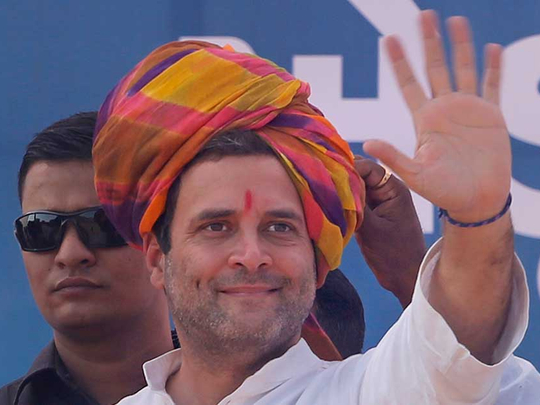
Rahul Gandhi’s coronation as the president of India’s Congress party next month is taking place at the right time for him and the organisation. Over the last two months, he has undergone a remarkable metamorphosis. It is difficult to say why or how this change has taken place, but there is little doubt about its reality.
From someone who tried to cover up his inadequacies in the fields of ideas and oratory by his shrillness in parliament and outside, Rahul has suddenly become calm and composed — a person who can articulate his views cogently and is not afraid to mock himself by saying that he has been called “stupid” by a section of netizens ostensibly associated with the saffron camp.
Little wonder, therefore, that his election rallies in Himachal Pradesh and Gujarat, and especially in Gujarat, have drawn more enthusiastic crowds than during his earlier campaigns in Bihar and Uttar Pradesh. His maturity, too, is evident from his decision to dispense with as a propaganda ploy the popular jibe on social media about vikas or development growing crazy in Gujarat since he does not want any disrespect to be shown towards the prime minister. It is possible that the refined genes of the Nehru-Gandhi family are coming to the fore.
It is for this reason that senior leaders like Sharad Pawar are no longer averse to dealing directly with him, instead of preferring Sonia Gandhi.
It is not surprising, therefore, that the Bharatiya Janata Party (BJP) is no longer taking him lightly, as can be seen from the harshness of BJP stalwart and Prime Minister Narendra Modi’s attacks on the Congress — or “termites”, as he has called the party — and his charge about the intense dislike of Gujarat, which the Congress and the ‘dynasty’ apparently harbours against the state. Clearly, if the BJP is sanguine about winning 150-plus seats in Gujarat as a step towards ushering in a Congress-mukt (free) India, then there would not have been the need for Modi to spend so much time campaigning in a single state, especially when it is regarded as his bailiwick. Or for the BJP to raise the inevitable suspicion that it persuaded the Election Commission to delay for a few weeks the announcement of the poll dates in Gujarat so that some more sops for the electorate could be rolled out by the state government before the model code of conduct came into force.
The BJP’s nervousness about the unexpected challenge posed by someone whom it routinely derided as “Pappu” or an adolescent might have been exacerbated by the sudden praise heaped on Rahul by a spokesman of the BJP’s ally, the Shiv Sena, who even said that the Congress vice-president was capable of becoming the prime minister — a possibility to which neither Rahul’s friends nor foes had alluded to before.
The ascent of the Nehru-Gandhi scion is also timely where the Congress is concerned. There is little doubt that the party has come out of the slough of despondence into which it had sunk in the aftermath of its performance in the last general election in 2014 — its poorest-ever. One reason why it is no longer going about in a daze is its marginal recovery from the 2014 drubbing because of the party’s successes in the Punjab assembly elections and in the by-election in Chitrakoot, in Madhya Pradesh, recently, where it managed to increase its vote share. Besides, the party occupied the No 1 position in the Goa and Manipur assemblies earlier, before the BJP lured away some of the Congress legislators.
The Congress is also exuding greater confidence because of the belief that it is on the verge of a generational shift, which cannot but breathe new life into the party as its old guard retreats into the background and a younger lot — Sachin Pilot in Rajasthan, Jyotiraditya Scindia in Madhya Pradesh — takes charge. Their leader, Rahul Gandhi, in his new, less arrogant avatar is expected to play a crucial role at the national level along with other youngsters who are likely to be his allies, such as Akhilesh Yadav in Uttar Pradesh and Tejashvi Yadav in Bihar, although the latter is hamstrung by the taint of his father Lalu Prasad’s involvement in the fodder scam. It is not that all those who are 70-plus will be put out to pasture as the BJP has done with its visionary group comprising L.K. Advani, Murli Manohar Joshi, Jaswant Singh and Yashwant Sinha.
In the Congress, chief ministers like Amarinder Singh in Punjab and Siddaramaiah in Karnataka will continue to play important roles, but Rahul’s supremacy will not be in doubt just as Sonia’s isn’t. To many, the preponderance of the Nehru-Gandhi dynasty may be the fly in the ointment. No doubt the Congress’s opponents will press this point with increasing vehemence as the party shows signs of recovery via the successes of its student wing, the National Students Union of India, and its allies in the students’ union elections as in Delhi university, Allahahad university and Kashi Vidyapith. In the last two institutions, the Samajwadi Party’s students’ wing won over the Akhil Bharatiya Vidyarthi Parishad (ABVP) — the BJP’s student wing.
But the fact that the Congress is no longer a pushover is evident if only because it is gaining from the BJP’s missteps on the economy and its failure to control the militants in its ranks as can be seen from the threats that are being made against the director and actors of the film Padmavati, because it does not conform to the saffron version of medieval Indian history.
— IANS
Amulya Ganguli is a political analyst.








